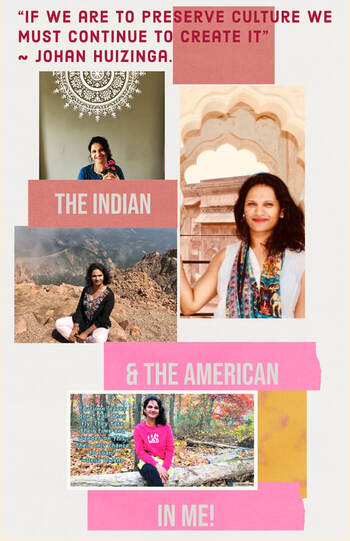 A recent conversation about identity got me thinking about what being Indian-American meant and how it fit my profile. Was my identity speaking through my roots or had it mutated during my long stay in America? Well, I was not born or raised in America. I moved here in my early 20s for higher studies and seek better job opportunities. Back then in India (in the 90s), job prospects were bleak for recent graduates who didn’t hold a medical or engineering degree. Young and fearless , I took the gigantic step of coming to the US alone for my Master’s degree in Biology (thanks to my very supportive family). 22 years later, I am a New Jersey resident and a US citizen. Navigating student and professional life was stressful but also quite an adventure. Surviving international student days meant missing family that was thousands of miles away, living frugally, maintaining a spotless GPA and trying to integrate into the cultural/social fabric! I remember walking into my Biology class at Western Kentucky University in Bowling Green, KY for the very first time in the spring semester of 1999 and was asked to introduce myself. My Indian accent plus using words like ‘flat,’ instead of apartment, or pronouncing the alphabet Z as ‘Zed,’ stirred up curiosity in my fellow American students. Amusement led to inquiry about India and that, my friends, was the beginning of cultural intermingling! Growing up in India the idea of America was created based on American authored books, hep TV shows like Beverly Hills 90210 and movies like Pretty Woman and other Hollywood hits! We were in awe of American life, its high-rises, fast cars and outspoken, ‘speak your mind’ youth! However, coming to Bowling Green, KY felt different. It was not in line with the stereotypical American image that I had clung to for so long! I had arrived in a small, quiet, mid-western town, with people speaking in an English accent that was unfamiliar to me. There were no high-rises here or the fast pace that popular western movies had portrayed. Despite initial hiccups in adjusting, the free-spiritedness, conveniences/opportunities offered in America had me hooked! I soon made great friends and fell in love with creative teaching methods adopted by my professors. After graduation, I traveled across the US, from KY to OK to MD for work and to many other states for pleasure. All along, I learned valuable lessons of generosity, was introduced to cuisines like Tex-Mex that reflected cultural intermingling and became aware of each American’s pride in their identity! Any racial discrimination that I encountered was replaced by a fellow Kentuckian’s or fellow Oklahoman’s acceptance of ‘me.’ I am now a full-time yoga teacher and have been fortunate to engage with diverse populations. While I take pride in my Indian heritage, my personality has been shaped by my experiences in the US! I am now as much an American as I would consider myself Indian. We do not usually forget our ‘firsts.’ I had cast my first vote at 18 years of age in India and felt SO proud voting for the first time in the 2020 US general election, as a US citizen. So, what is my identity? A substantial part of my identity remains embedded in my roots. My roots keep me grounded but do not handcuff me from soaring high. The Indian in me devours curry and masala (spice) loaded food. I celebrate Indian values/Hindu traditions and wear Indian clothes whenever I can. As an American, I appreciate the professionalism, lawfulness, charitable nature, American traditions, and openness of the society. Coming from old/ancient cultures like India, societal norms are sometimes rigid and can get overbearing. US has allowed me to aspire, grow and breathe life into my dreams. I belong to two worlds and the best part is that I have been able to fuse both cultures meaningfully. I visit India often to reconnect with my family/friends, cherish ancient Indian history and eat authentic Indian food! Traveling across India has helped my kids become appreciative of their American as well as Indian roots and embrace their blended cultural identities. “It is not what I call you, it’s what you answer to; but if you don’t know who you are, anyone can name you. If anybody can name you, you will answer to anything.” African Wisdom Living in New Jersey/New York City area has accelerated my understanding of the term, melting pot! A global gateway city, NYC is a sensory revelation! It is energizing to walk on streets that resonate with various ethnicities, languages, cuisines, and mosaic of skin colors that have made America, home. As an immigrant, I can attest to the fact that it takes courage and adaptability to leave the simple comforts of your home country and part ways with your parents/family. Assimilating into another society comes with the pressure of succeeding or providing a better life for your future generations. Most people who migrate feel responsible for representing their native countries/cultures, impeccably. It rests on our shoulders to contribute positively, give back consciously and more importantly, be grateful for having an equal playing field, a platform where we can use our talents effectively and rise. In turn, a country that welcomes immigrants requires tolerance, acceptance, and cooperation from its natives. Most people who step into American soil legally, go through a rigorous immigration processes and are employed based on their education, merit, hard-work and unique skill sets. Tom Jawetz, vice president for Immigration Policy at American Progress writes in (Americanprogress.org) that, “Although immigrants made up just 13.7 percent of the U.S. population in 2017, they made up almost 30 percent of all new entrepreneurs in the United States that year. Immigrants continue to be nearly twice as likely as native-born people to start businesses.” Shared prosperity in a vibrant economy ultimately boosts innovation and propels progress. Diversity can seem threatening. It can trigger insecurities about identity erosion and can drive the need for cultural preservation in native populations. However, in a world where migration happens widely, I must highlight that cultural mixing can empower societies, enrich traditions, and broaden perspectives. Many apprehensions concerning immigrants arise from lack of awareness or pre-conceived notions about their background. Insecurities can exist on both sides! My suggestion? Travel as much as possible, do not be afraid to try new foods, immerse yourself in the fluidity of world music, acquaint yourself/participate in different traditions and open your minds to new experiences. Lastly, I would say this, like in my own case, while my Indian roots are my foundation, the tree on top has expanded into several branches, nourished by new environments. My identity is not lost. It has grown and metamorphosed to what is now, Indian-American! This, in my opinion, is the idea of America. Namaste. “The essence of America, that which really unites us, is not ethnicity, or nationality or religion. It is an idea, and what an idea it is — that you can come from humble circumstances and do great things.” Condoleezza Rice
2 Comments
Hiren
4/17/2024 01:34:15 am
This is a wonderful article, and I’m so glad I came across it. Identity crisis is something that I have been going through since COVID… and knowing that others have had similar experiences makes what I have felt validated. Thank you for writing this. Like you I have also live in NYC, and that being a city full of diversity allows you to appreciate your identity even more.
Reply
4/17/2024 02:21:11 pm
Thanks Hiren! So happy that the blog resonated with you. Culture plays a huge role in shaping our views and who we become! As you said, diversity allows us to appreciate our identity even more.
Reply
Leave a Reply. |
Author : Deepti GuptaAll of us have a story to tell. Turning life's experiences into stories is empowering and fulfilling. I feel fortunate to have a platform where meaningful discussions can materialize. Thanks for joining me! Here we wander not to get lost but to self-explore! Archives
December 2022
Categories |
Search by typing & pressing enter

 RSS Feed
RSS Feed